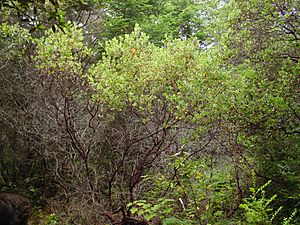Hairy manzanita facts for kids
Quick facts for kids Hairy manzanita |
|
|---|---|
 |
|
| Conservation status | |
| Scientific classification | |
| Kingdom: | |
| (unranked): | |
| (unranked): | |
| (unranked): | |
| Order: | |
| Family: | |
| Genus: | |
| Species: |
A. columbiana
|
| Binomial name | |
| Arctostaphylos columbiana Piper
|
|
| Synonyms | |
|
Arctostaphylos tracyi |
|
The hairy manzanita (scientific name: Arctostaphylos columbiana) is a special kind of shrub or small tree. It's known for its fuzzy leaves and branches. You can find this plant growing along the coast of western North America. It stretches all the way from northern California up to southwestern British Columbia.
Contents
About the Hairy Manzanita
The hairy manzanita is a type of manzanita plant. It can grow quite tall, usually between 1 and 5 meters (about 3 to 16 feet). Its branches stand upright and are covered in tiny hairs, which gives the plant its "hairy" name.
Leaves and Flowers
Its leaves are oval-shaped and feel fuzzy on both sides. They are a pale bluish-green color and usually measure about 2 to 6 centimeters long.
In spring, the hairy manzanita grows small, white flowers. These flowers look a bit like tiny urns or bells. They grow in bunches, making them easy to spot.
Fruit and Seeds
After the flowers, the plant produces small, round fruits. These fruits are red and look like berries, but they are actually a type of fruit called a drupe. Each fruit is about 1 centimeter wide.
The seeds inside these fruits need special conditions to sprout. They usually need either a forest fire or to be eaten by animals. When animals eat the fruit, the seeds pass through their digestive system. This process helps the seeds get ready to grow.
Where it Grows
The hairy manzanita likes to grow in open, rocky areas. It's a tough plant that can survive in these kinds of places. Sometimes, people even plant it in their gardens because it's a beautiful ornamental plant.
Plant Hybrids
Sometimes, the hairy manzanita grows close to another type of manzanita called Arctostaphylos uva-ursi. When this happens, they can sometimes create a new plant that is a mix of both. This mixed plant is called a hybrid, and its scientific name is Arctostaphylos x media.
See also
 In Spanish: Arctostaphylos columbiana para niños
In Spanish: Arctostaphylos columbiana para niños
 | William L. Dawson |
 | W. E. B. Du Bois |
 | Harry Belafonte |


